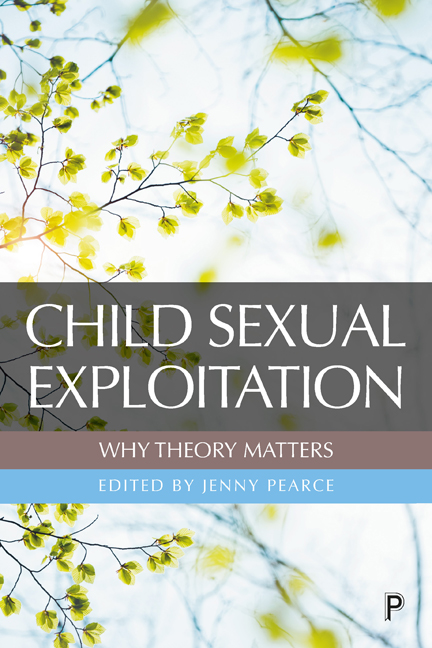Book contents
- Frontmatter
- Contents
- List of Figures and Tables
- Notes on Contributors
- Editor’s Acknowledgements
- Foreword
- 1 Bringing Theory Home: Thinking About Child Sexual Exploitation
- 2 Moving Beyond Discourses of Agency, Gain and Blame: Reconceptualising Young People’S Experiences of Sexual Exploitation
- 3 Child Sexual Exploitation, Discourse Analysis and why we Still Need to Talk About Prostitution
- 4 Contextual Safeguarding: Theorising the Contexts of Child Protection and Peer Abuse
- 5 ‘Losing Track of Morality’: Understanding Online Forces and Dynamics Conducive to Child Sexual Exploitation
- 6 Understanding Adolescent Development in the Context of Child Sexual Exploitation
- 7 Some Psychodynamic Understandings of Child Sexual Exploitation
- 8 Understanding Trauma and its Relevance to Child Sexual Exploitation
- 9 Social Support, Empathy and Ecology: A Theoretical Underpinning for Working with Young People who have Suffered Child Sexual Abuse or Exploitation
- 10 Using an Intersectional Lens to Examine the Child Sexual Exploitation of Black Adolescents
- 11 What’s Gender Got to do With It? Sexual Exploitation of Children as Patriarchal Violence
- 12 Understanding Models of Disability to Improve Responses to Children with Learning Disabilities
- 13 Some Concluding Thoughts
- Index
2 - Moving Beyond Discourses of Agency, Gain and Blame: Reconceptualising Young People’S Experiences of Sexual Exploitation
Published online by Cambridge University Press: 10 March 2021
- Frontmatter
- Contents
- List of Figures and Tables
- Notes on Contributors
- Editor’s Acknowledgements
- Foreword
- 1 Bringing Theory Home: Thinking About Child Sexual Exploitation
- 2 Moving Beyond Discourses of Agency, Gain and Blame: Reconceptualising Young People’S Experiences of Sexual Exploitation
- 3 Child Sexual Exploitation, Discourse Analysis and why we Still Need to Talk About Prostitution
- 4 Contextual Safeguarding: Theorising the Contexts of Child Protection and Peer Abuse
- 5 ‘Losing Track of Morality’: Understanding Online Forces and Dynamics Conducive to Child Sexual Exploitation
- 6 Understanding Adolescent Development in the Context of Child Sexual Exploitation
- 7 Some Psychodynamic Understandings of Child Sexual Exploitation
- 8 Understanding Trauma and its Relevance to Child Sexual Exploitation
- 9 Social Support, Empathy and Ecology: A Theoretical Underpinning for Working with Young People who have Suffered Child Sexual Abuse or Exploitation
- 10 Using an Intersectional Lens to Examine the Child Sexual Exploitation of Black Adolescents
- 11 What’s Gender Got to do With It? Sexual Exploitation of Children as Patriarchal Violence
- 12 Understanding Models of Disability to Improve Responses to Children with Learning Disabilities
- 13 Some Concluding Thoughts
- Index
Summary
Introduction
Child sexual exploitation (CSE) (as currently defined within the United Kingdom) is a form of child sexual abuse (CSA), typified by the presence of exchange, whereby the victim and/or perpetrator receives something in return for the sexual activity. It is this exchange dynamic that distinguishes CSE from other forms of CSA within current UK and many other nations’ definitions. It is also this exchange dynamic, where the young person is the one deemed to be benefiting from the exchange that raises particular questions about the exercise of agency within abusive situations; the focus of this chapter.
Drawing on a decade of primary and secondary research in the field, I explore the relationship between victimhood and agency, and the unhelpful binary ways in which it has often been conceptualised within CSE discourse and practice to date. I observe how adherence to dichotomous conceptualisations of those experiencing CSE, and associated narrow understandings of CSE victimhood, have served to diminish our responses to particular populations and particular manifestations of harm; namely those typified by any degree of observable agency on the part of the child.
Both my own research and the wider body of literature clearly articulate the need for ‘a new sexual abuse narrative’ (Woodiwiss 2018:163) if we are to address the evidenced shortcomings in CSE practice. This narrative must be capable of accommodating the co‑existence of choice and constraint, benefit and harm, and victimhood and agency that I and other researchers have observed to be present in many young people's experiences of CSE (Pearce 2010; Beckett 2011; Melrose 2012, 2013; Beckett et al 2013; Warrington 2013; Hallett 2017; Woodiwiss 2018). It is my contention that Gidden's (1976) structuration theory, widely utilised in other fields but not yet in relation to CSE, offers a helpful framework around which such a narrative can be developed.
Reframing young people's experiences of CSE through the lens of structuration theory offers a much-needed way to move us beyond the observable simplistic binary conceptualisations of victimhood versus agency. It helps us to better understand and respond to the widely variable and complex dynamics and contexts of CSE. Specifically, reconceptualising young people as ‘reflexive agents’ operating within a ‘structure of constraint’ offers us a means of concurrently recognising the range of biographical and contextual factors at play in any given situation, and allows us to move beyond exclusionary ‘idealised’ victim-based patterns of identification and response.
- Type
- Chapter
- Information
- Child Sexual Exploitation: Why Theory Matters , pp. 23 - 42Publisher: Bristol University PressPrint publication year: 2019



